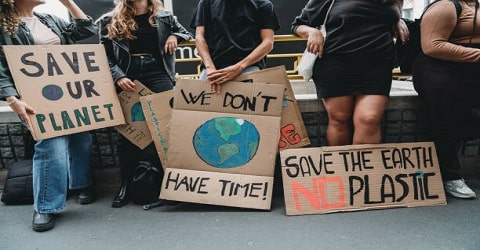
IMF's Commitment to Paris Agreement: A Critical Step Towards Climate Action
IMF’s commitment to Paris Agreement signifies a significant stride towards climate action. Kristalina Georgieva’s reappointment heralds a crucial phase, coinciding with the decisive decade to combat climate change and fulfill UN Sustainable Development Goals. Under her leadership, IMF acknowledged climate change as a macroeconomic imperative, launching its inaugural climate-change strategy and the Resilience and Sustainability Trust. Yet, bolder steps are imperative.
Aligning IMF financing with Paris Agreement objectives is paramount, ensuring inclusive, low-carbon development paths. Moreover, bolstering IMF’s financial capabilities, amplifying the voices of climate-vulnerable economies, and fostering global cooperation are indispensable. Georgieva’s stewardship must galvanize collective efforts towards a sustainable future.
IMF’s Commitment to Paris Agreement
In a landmark decision, the board of the International Monetary Fund (IMF) recently approved Kristalina Georgieva for another five-year term as Managing Director. This decision arrives at a pivotal moment, coinciding with what experts term as the “make-or-break” decade for addressing climate change and advancing the United Nations Sustainable Development Goals.
Georgieva’s continued leadership is not just a reaffirmation of her capability but also an endorsement of the IMF’s commitment to global challenges, particularly climate action.
Here are seven crucial points highlighting the IMF’s dedication to the Paris Agreement and its significant role in climate action:
Table of Contents
1. Renewed Leadership at the Helm
The recent approval of Kristalina Georgieva for another five-year term as Managing Director of the International Monetary Fund (IMF) comes at a pivotal moment. Her tenure coincides with the critical juncture of this decade, which is deemed as make-or-break for combatting climate change and advancing the United Nations Sustainable Development Goals.
The IMF’s commitment to Paris Agreement underscores its role in fostering global economic stability while prioritizing environmental sustainability. Georgieva’s leadership will undoubtedly steer the IMF towards further integrating climate considerations into its policies and lending practices, amplifying efforts to mitigate the escalating threats posed by climate change.
Read More: Green Hydrogen Development in Africa: Opportunities and Challenges
2. Alignment with Global Climate Goals
Under Georgieva’s stewardship, the IMF has taken significant strides towards aligning its policies with the imperatives of climate action. Recognizing climate change as a macro issue within its mandate, the IMF launched its inaugural climate-change strategy.
This strategic shift underscores the IMF’s commitment to address climate-related challenges through financial instruments such as the Resilience and Sustainability Trust (RST). Moreover, the IMF’s commitment to Paris Agreement further solidifies its dedication to combating climate change on a global scale.
3. Urgent Need for Bolder Leadership
Despite the progress made, the IMF needs to demonstrate even greater leadership in addressing climate change. As the primary institution tasked with ensuring global financial stability, the IMF’s role in climate action is indispensable, especially considering the IMF’s commitment to Paris Agreement.
Georgieva’s second term presents an opportunity to consolidate and expand upon the achievements of her first term. This entails not only advocating for sustainable economic policies but also actively supporting member countries in transitioning to low-carbon economies. By integrating climate considerations into its policy advice and lending programs, the IMF can catalyze a more resilient and sustainable global economy.
Read More: Unlocking Amazon Conservation Beyond Bioeconomy: A Critical Examination
4. Commitment to Paris Agreement
Foremost among the IMF’s priorities should be a firm commitment to align with the Paris Agreement. This entails integrating climate considerations into all IMF programs, promoting low-carbon development pathways, and avoiding fossil-fuel-intensive growth trajectories that undermine global climate objectives.
Furthermore, the IMF’s commitment to Paris Agreement must be robustly demonstrated through its advocacy for sustainable policies and investments, its support for climate-resilient infrastructure projects, and its collaboration with member countries to implement ambitious climate mitigation and adaptation strategies.
This alignment not only underscores the IMF’s dedication to addressing the urgent challenge of climate change but also reinforces its role as a proactive agent of global economic stability and sustainability.
5. Enhancing Financial Capacities
Georgieva must also prioritize bolstering the IMF’s financial capabilities, including its commitment to the Paris Agreement, to effectively support member states in their climate transition endeavors. The current level of financial resources falls short of the escalating demands, necessitating a substantial increase in member state quotas to adequately address climate-related shocks and challenges.
With the IMF’s commitment to Paris Agreement, these increased resources can be channeled strategically to assist nations in meeting their climate goals while fostering economic stability and resilience.
Read More: Fair Taxing Policies for Global Polluters: The Key to Climate Justice
6. Inclusive Decision-Making
Ensuring the representation of climate-vulnerable economies in IMF decision-making processes is paramount, particularly given the IMF’s commitment to the Paris Agreement. Despite their heightened vulnerability to climate impacts, these economies possess disproportionately low voting power within the IMF.
Georgieva should advocate for reforms that enhance the voice and agency of these nations in shaping IMF policies and initiatives. By aligning decision-making processes with the goals of Paris Agreement, the IMF can better address the unique challenges faced by climate-vulnerable economies and promote more equitable and sustainable global economic development.
7. Collaboration and Resource Mobilization
Recognizing that addressing climate change requires collective action, including the IMF’s commitment to Paris Agreement, the IMF must collaborate closely with other international institutions and stakeholders. By leveraging partnerships with entities like the World Bank, the IMF can amplify its impact and mobilize additional resources to support climate resilience and adaptation efforts globally.
This commitment not only strengthens the IMF’s role in addressing environmental challenges but also fosters greater cohesion among international organizations in tackling climate-related issues.
Bottom Line
Kristalina Georgieva’s reappointment as Managing Director of the IMF signifies a continuation of the institution’s commitment to climate action. However, the challenges posed by climate change demand even greater ambition and urgency. By aligning with the Paris Agreement and bolstering its commitment to sustainability, the IMF can further solidify its role as a key player in global climate initiatives.
Enhancing financial capacities, promoting inclusive decision-making, and fostering collaboration are essential components of this mission. With the IMF’s commitment to Paris Agreement, Georgieva’s leadership will be instrumental in ensuring that the IMF rises to the challenge posed by the climate crisis in this critical decade, demonstrating its dedication to combating climate change on a global scale.





